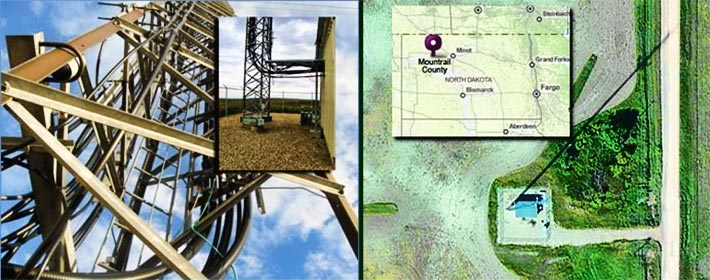
Monarch Towers Inc. was beefing up this 315 foot guyed tower owned by Mountrail Williams Electric Cooperative when the accident occurred.
A Florida federal judge on Friday ruled that a tower erector’s insurance company doesn’t have to represent and indemnify Sarasota, Florida-based Broadcast Tower Technologies in a lawsuit following a July 8, 2013 accident in New Town, North Dakota that resulted in the death of two tower techs, but it does have to represent the contractor’s bankrupt company and its owner.
According to court documents, tower techs Namon Smith and Zachary Roberts were working on a reinforcement project on a 315-foot tower when it is alleged that Smith was not properly tied off and fell, striking Roberts below him.
The impact caused Roberts’ full body harness and shock absorbing lanyard to fail and Roberts fell, along with Smith, approximately 200-feet to their death.
Roberts’ wife, Kyla, then sued Jack Boone, President of Monarch Towers; Roberts’ employer Monarch Towers; Broadcast Tower Technologies (Broadcast); Southeast Personnel Leasing, Inc. (SPL) and Capital Safety USA.
On November 13, 2017, Evanston Insurance Company of Illinois requested the U.S. District Court Middle District of Florida to issue a declaratory judgment to determine the insurance carriers’ responsibility to claims of bodily injury asserted against Monarch and Boone by Roberts’ Estate.
Monarch and Boone demanded that Evanston provide them with a defense and indemnification against the Estate’s complaint, as did Broadcast.
Evanston claimed that Broadcast could not qualify as an additional insured under the Monarch policy and provided a contract between both parties that identified that there are no provisions which required Monarch to provide Broadcast coverage under its liability policies.
Evanston also argued that an endorsement clearly stated that “no coverage shall be afforded to the Additional Insured for injury or damage of any type to any ‘employee’ of the Named Insured or to any obligation of the Additional Insured to indemnify another because of damages arising out of such injury or damage.”
U.S. District Judge Susan Bucklew agreed, in part.
Although the Estate pointed out a contract between Monarch and Broadcast that states: “Contracting Parties will comply with the insurance requirements set forth in Schedule 1 attached hereto and incorporated herein by reference,” Bucklew said in her ruling that neither the Estate nor Evanston has produced Schedule 1, “and it may be that Schedule 1 does not exist. Even if Schedule 1 does exist, there is no evidence that Schedule 1 mandates that Monarch provide additional insured coverage for Broadcast.”
Bucklew said that Evanston did not have to defend nor indemnify Broadcast for the Estate’s claims in the state court action, but it had to defend Monarch and Boone.
Evanston had previously submitted substantial evidence that Roberts was, in fact, employed by Monarch or was a leased worker From SPL and the Estate’s action should not be brought against Monarch’s general liability policy since there is no coverage for his bodily injuries which would be covered by Monarch’s workers compensation insurance.
In a May 23, 2019 deposition by an SPL representative, the leasing company said it was not Roberts’ employer at the time of the accident.
According to Heather Clark, Monarch signed an employee leasing agreement a year before the accident on July 23, 2012, but it was terminated on July 4, 2013, four days before the fatalities. Clark could not identify who terminated the agreement or why it had ended. She said the holiday date appeared because it would have been their latest pay period.
However, according to an SPI intake sheet document, the Roberts fatality was received and processed on the afternoon of the accident.
It was identified in the SPI-Monarch agreement that it only covered techs performing work in Florida. The contract states: “If the employee is injured while outside of the State of Florida or on a trip outside the State of Florida, he or she will be considered the employee of the Client.”
Clark said that Roberts was brought to SPL by Monarch at $23 an hour and he was hired by SPL on June 27, 2013.
Monarch filed for Chapter 7 bankruptcy on May 21, 2014.
North Dakota is a monopolistic state fund state where private workers compensation insurance is not permitted and its the only source for workers insurance is through North Dakota. It is not known if the Smith and Roberts families were able to receive compensation.


















